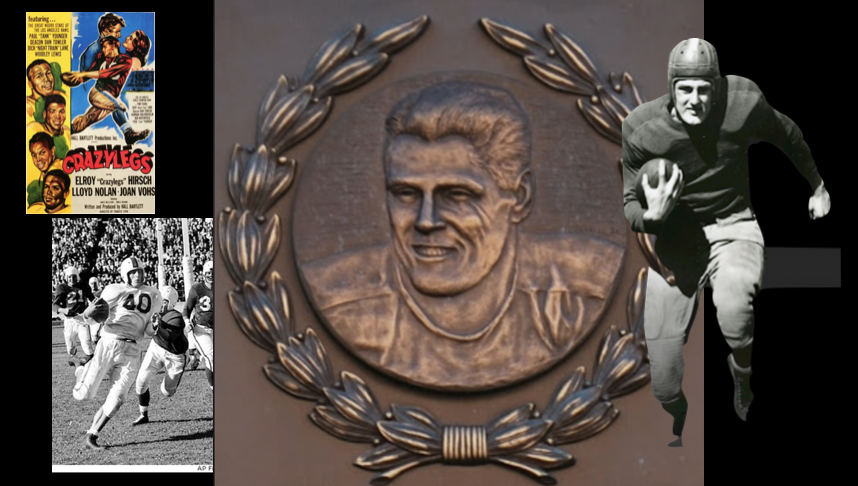Elroy “Crazylegs” Hirsch was an iconic figure in American football, known for his outgoing personality off the field and his agility, speed, and innovative playing style on the field that revolutionized the game. Born on June 17, 1923, in Wausau, Wisconsin, Hirsch’s path to football stardom was anything but conventional. His nickname “Crazylegs” was bestowed upon him due to his unique, zigzag running style that baffled defenders, making him one of the most elusive backs of his era.
Hirsch’s early life was marked by academic and athletic prowess. He attended the University of Wisconsin, where he initially played basketball, not football. However, his football career took off when he transferred to the University of Michigan. There, under coach Fritz Crisler, Hirsch’s talent was honed, and he quickly became a standout player. His college career was interrupted by World War II, where he served in the U.S. Marine Corps, including a stint in the Battle of Iwo Jima, earning him the Purple Heart.
Post-war, Hirsch enrolled at the University of Michigan, completing his degree and football career. His professional journey began with the Chicago Rockets of the All-America Football Conference (AAFC) in 1946. Despite initial struggles, Hirsch’s career took a significant turn when he was traded to the Los Angeles Rams in 1949, just as the AAFC merged with the NFL.
In Los Angeles, Hirsch thrived. His impact was immediate; in his first season with the Rams, he led the NFL in receiving yards with 1,495, setting a new league record. His performance earned him the NFL’s Most Valuable Player award in 1951, a testament to his dominance on the field. Hirsch was not just a runner; he was a pioneer in the art of pass receiving, often running precise patterns and making spectacular catches that were ahead of his time.
Beyond his athletic achievements, Hirsch was known for his sportsmanship and integrity.
Hirsch had a brief career as a Hollywood actor in the 1950s, He starred in Crazylegs (1953) – This film was centered around his own football career, where Hirsch played himself, showcasing his unique running style and football achievements. “Unchained” (1955) – Here, Hirsch played a convict in a medium-security prison, exploring themes of confinement and freedom.“Zero Hour!” (1957) – In this film, Hirsch portrayed a pilot who becomes incapacitated after eating tainted fish, contributing to the film’s dramatic narrative about an airline disaster (Fans of the Movie Airplane! take particular note of the plotline, as the movie served as the inspiration for the cult classic made by Wisconsin natives and UW Madison alums.)
After retiring from football in 1958, he transitioned into a successful career in sports and business, including a stint as the general manager of the Rams. His contributions to football were recognized with his induction into the Pro Football Hall of Fame in 1968.
Crazylegs then as the Athletic Director at the University of Wisconsin from 1969 through 1987. During his tenure, the athletic department saw increasing home game attendance for their major sports and the introduction of new opportunities for student athletes to compete.
The Crazylegs Classic is an annual 8K run and 2-mile walk fundraising event held in Madison, Wisconsin, named in honor of Elroy Hirsch. This event, which began in 1982, raises money for the Athletic department. The founders named the event the “Crazylegs Run” after Hirsch, celebrating his legacy and that unique running style that earned him his nickname.
Over the years, the Crazylegs Classic has grown into a significant community event, not only supporting Wisconsin Athletics but also contributing to the economic impact on the City of Madison, with participants from across the state and beyond. The race takes participants through the University of Wisconsin campus and the city, emphasizing the University’s ties to the Capital city.
Elroy Hirsch’s legacy extends beyond his athletic feats. He became a Wisconsin icon. His innovative playing style influenced generations of players, and his character off the field made him a beloved figure in sports history.
Hirsch passed away on January 28, 2004, but his impact on football and those who knew him remains indelible.
















